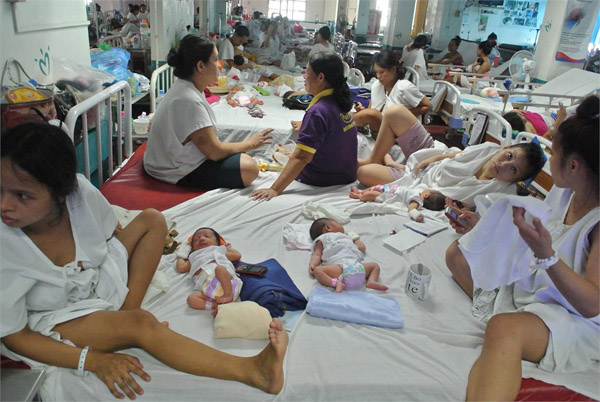As Americans, we tend to think of hospital delivery rooms as sterile places, in which mothers receive a certain amount of privacy and comfort. But in Manila, the conditions are quite different, at least for women giving birth at Jose Fabella Hospital, which reportedly has the busiest maternity ward in the world. One of the earliest shots in this relatively straightforward yet surprisingly intimate documentary is of a waiting room that would already seem busy by our country’s standards. Things only get more hectic from there.
Past the crowded hallways and into the ward itself, we find what seems like endless rows of beds packed close together, upon which countless mothers are sprawled out. These scenes eventually give way to footage inside the delivery room, where women in labor share cots and are practically situated one on top of the other. The deliveries themselves come fast and furious, the obstetricians and nurses going about the work with little time for sentimentality. Once the newborn is out of the mother, they quickly place it into her arms and move on to the next. There’s no respite for them, no congratulations for her.
The camera is a detached observer to the interactions between hospital employees and the women, many of which involve the former instructing the latter on the basics, such as how to hold their babies and nurse them. Those mothers whose births were premature are indoctrinated into the technique of kangaroo care, in which they wear a tube top that keeps the baby’s body against theirs, letting them act as a human incubator. There are also attempts by social workers to convince patients to get an intrauterine device or have their tubes tied, but these efforts are less successful.
The three mothers who are the film’s main subjects each worry about the cost of their hospital stay, though it’s only gradually that we realize just how poor they are. One, who has just given birth to twins, says her husband has not visited yet because he doesn’t have the few pesos it would cost to ride over. Another has multiple children at home and claims their household gets by selling eggs and cigarettes. Many have no idea how they will pay the bills, which can be the equivalent of hundreds, if not thousands, of American dollars. At the same time, they cannot leave until they pay at least part of the bill.
Pressed together in close quarters, waiting until their babies have put on enough weight so that it’s safe for them to go home, a sense of camaraderie forms between the women, who complain to one another about their husbands, the labor pains they endured, and even the doctors. So great is the level of friendship that when one mother goes away to take a shower, leaving her baby unattended, another readily nurses it at her breast when it’s hungry.
Still, the hospital is no paradise, and director Ramona S. Diaz’s captures the tediousness of an environment in which babies are constantly screaming in the background. In addition, the nurses can be strict, leaving the mothers seeming a bit resentful. The hospital workers are also pushy regarding family planning. The mothers themselves cannot put into words why they would refuse even an IUD, other than fear of the pain or having been warned against it by their own mothers. Their religion looks to be a contributing factor, as most of the interviewees claim they are Catholic.
What makes Motherland an involving, if frequently frustrating, viewing experience is seeing them make potentially bad decisions, which not only affects their own lives but those of their new children. Nevertheless, the film offers a fascinating look at birthing procedures on the other side of the world and their underlining problems, such as a lack of health care for the poor, education regarding birth control, and the need for greater resources to meet a rapidly-growing demand. Those are, of course, issues that are also engendering much soul-searching stateside, making this a film worth seeing no matter where you live.







Leave A Comment